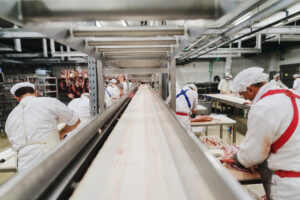
Abattoirs, butchers and meat processors are set to employ prisoners and ex-inmates to help plug labour shortages.
Meat industry leaders held talks with the government on Monday to discuss options of how businesses could link up with prisons to fill vacancies.
The Association of Independent Meat Suppliers told the Business Matters the industry had about 14,000 job vacancies currently.
It said Covid, Brexit and perceptions over career paths had caused a looming “recruitment crisis”.
The industry body said businesses would seek to link up with prisons that contain prisoners who are part of the Release On Temporary Licence (ROTL) programme.
ROTL is a risk-assessed temporary release programme that inmates in open prisons use to gain work experience to help them in their transition back into the community.
Tony Goodger, of the Association of Independent Meat Suppliers, said the industry body would contact members who required staff and work with the Ministry of Justice to put them in contact with prison services, in a bid to recruit people about to leave prison or current inmates.
Mr Goodger said some members already employed inmates on ROTL, and had found them to be “well behaved, hard-working, and willing to learn”.
“It’s down to the members [who they employ],” he said. “They [prisons] have got offenders and prison-leavers, we have got members who need labour. It seems sensible to bring the two together.”
Turkey processing giant Bernard Matthews has previously formed links with HMP Norwich and regularly visits the prison as part of its recruitment cycle, to assess candidates and offer inmates contracts to start upon release.
Mr Goodger said that many prisons taught inmates food safety skills, which would aid them in finding work in the industry.
“We have suggested that they look at some of the other free training available such as the FSA’s Allergen training and Vacuum Packing training, in order that offenders can leave prisons ‘job ready’,” he added.
The food manufacturing industry has also looked to employ former armed service personnel. However, the number of people taking up jobs has been low.
The Covid pandemic and Brexit have both contributed to current worker shortages, with furloughed workers finding new jobs and EU nationals returning to their home countries.
The British Meat Processors Association said the current level of vacancies represented about 15% of the industry’s workforce.
The industry body said its members were “trying absolutely every avenue” to recruit workers.
Training expansion
The government recently announced the expansion of a kitchen training scheme across jails in England and Wales.
The Clink Kitchens Scheme sees prisoners train in professionally run prison kitchens for up to 35 hours a week while working towards professional qualifications to help them find employment on the outside.
However, the food industry is not the only sector to witness a shortage of workers. A lack about 90,000 HGV drivers “is placing increasingly unsustainable pressure on retailers and their supply chains”, according to lobby groups.
In a letter to Kwasi Kwarteng, the business secretary, the British Retail Consortium (BRC) and freight trade group Logistics UK have warned that consumers will suffer unless the government intervenes.
A Ministry of Justice spokesman said it would support “all industries with skills shortages where possible”.
“Helping prisoners find jobs during their sentence and after release makes it much less likely they will reoffend,” he added.
Read more:
Prisoners to plug worker shortage in meat industry

